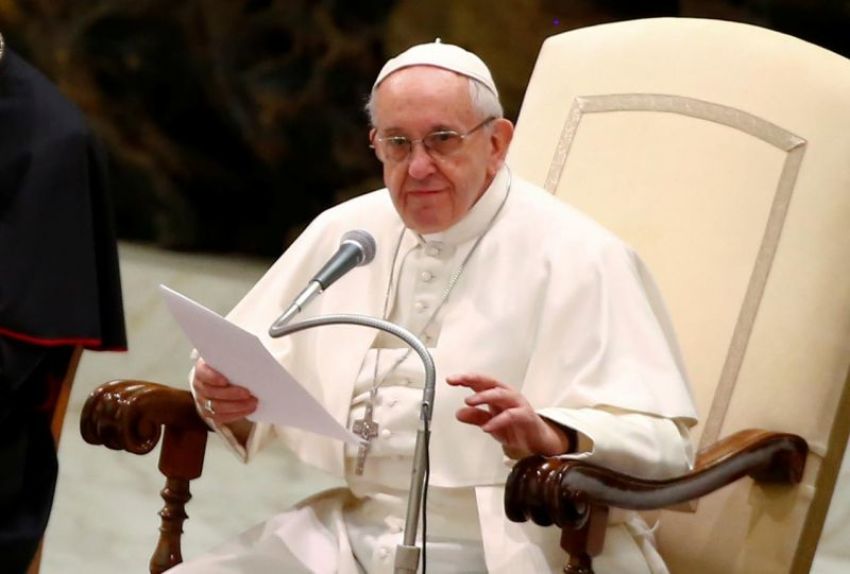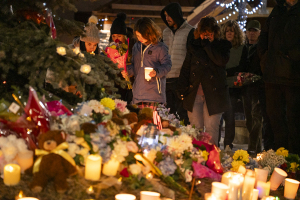Pope Francis, Peace in the Middle East Cannot Be Built With Platitudes

(JNS) Pope Francis, arguably the world's most influential religious leader, offered platitudes in his prescription for peace in the strife-torn Middle East.
Francis recently spoke to a convocation of Christian clergy from the region. Because so many calamities are playing out there simultaneously, it was not always apparent to which disaster he was referring when he declared: "Let there be an end to using the Middle East for gains that have nothing to do with the Middle East!"
Who did he mean? The Ayatollah, Putin, Trump, Erdoğan?
"You cannot speak of peace while you are secretly racing to stockpile new arms. This is a most serious responsibility weighing on the conscience of nations, especially the most powerful." Secretly stockpiling? The only Middle East country secretly racing to stockpile weapons is Iran. It is unlikely that he wished to further inflame a regime that actively persecutes Christians and Baha'i. Could he have been referring to Western powers? Is he suggesting unilateral disarmament of NATO, or even perhaps the United States? We, too, pray for the fulfillment of Isaiah's vision of beating swords into plowshares, but until the Messiah shows up, it's unlikely that the evil-doers would follow suit. Does not the Church, to its credit, teach about the diabolical power of evil and that until a time of universal redemption arrives, evil must be resisted and contained?
Concerning one part of the Middle East, the pope left little room for doubt. "No more occupying territories and thus tearing people apart!" He could have meant the Turkish occupation of a good chunk of Cyprus—or even the Chinese occupation of Tibet. From another reference to "walls," however, it seems that he meant the Jewish State of Israel. Could he really have said something so simplistic? Has he not noticed that the Palestinians have indeed been torn apart by the deadly power struggle between Hamas terrorists in Gaza and the kleptomaniacs of the Palestinian Authority? Does he need a refresher course in history to remind him that before anyone could spell "occupation," Arab armies promised to eradicate Israel in a bloodbath of unseen proportions?
The worst line: "Truces maintained by walls and displays of power will not lead to peace, but only the concrete desire to listen and to engage in dialogue." If only there were a truce! But since the return of the Jewish people to its homeland of thousands of years by acclamation of the world community in 1947, there have been no truces; indeed, Israel has not enjoyed one day of quiet without its neighbors planning her demise. More importantly, walls may be unsightly and disruptive, but they work. Vatican City is surrounded by walls. Walls keep the crowds away from the pope when he blesses them in St. Peter's Square. After Mehmet Ali Ağca tried to assassinate Pope John Paul II in 1981, the would-be assassin spent 29 years in a prison cell. It had walls. And a locked door.
In the case of Israel, the wall that Francis detests has kept suicide-bombers out of shopping malls and Christian holy places. In an imperfect world, walls are a necessity. The pope has not yet proposed an alternative.
Pundits think that the Church has lost so many adherents in the West because it is too restrictive about behavior and too demanding about belief in dogma. But many people would stay the course if they receive satisfying answers to questions about meaning and purpose, and practical advice on how to live a more elevated life. Religion fails when it gets mired in scandal or offers empty slogans. "Peace in our time!" "Workers of the world, unite!" Make love, not war!"(These prove that one-liners made often make matters worse.) When religious leaders offer nothing but platitudes instead of practical ideas that can work, many of the faithful tune out or just check out altogether.
What's a pontiff to do? Stick to basics. The word "peace" in the Hebrew Bible (shalom) relates to the word shalem—or "whole," "complete." It suggests that peace will never come to the world until people are truly fulfilled and self-actualized. That is where Francis's own personal example could be so effective. No one will ever feel let down by learning from Francis to live more simply and humbly, and to delight in being able to help those in need. His contribution, alongside other religious leaders, should be instructing more people how to become shalem, one by one, and therefore capable of peace.
With millions of Christian, Jewish and Muslim lives in the Middle East hanging in the balance, what's wrong with admitting that bringing peace to that region may be above even the pope's pay scale?
Sometimes, Your Holiness, "silence is golden." Sometimes, that response will resonate with the faithful. It is certainly a better strategy than articulating simplistic and inaccurate formulas.



























